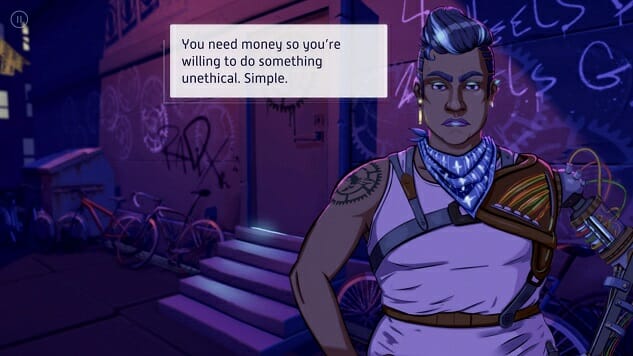Neo Cab Knows Choices in Games—and in Capitalism—are Often Illusions

Choices in a capitalist world are often just illusions, much as in videogames. If you’re not well off, you navigate through a framework that the rich have crafted for you in which you are kept poor and struggling as they only amass more wealth. Nobody chooses to live paycheck to paycheck, nor do they truly choose to decide whether to skip a meal to save money or eat but risk not having enough for the bills. Neo Cab is one of the few games that relentlessly speaks to these experiences and uses this truth to its advantage to provide a realistic, intriguing and cathartic experience.
Neo Cab puts you in the shoes (and cab) of Lina, a young latinx woman who upends her life to reunite with her best friend, Savvy, in a city called Los Ojos (spanish translation: The Eyes). Lina is a driver for the company Neo Cab as a statement against the megacorporation that is Capra, which controls almost everything from hotels to health insurance to technology. Soon after their reunion, Savvy goes missing and Lina uses her trade to find out what happened, discovering more about Los Ojos and its secrets throughout her talks with passengers.
In Neo Cab, you don’t actually drive the car; instead, you drive conversations, talking with and getting to know multiple passengers each night. It’s similar to a visual novel in which your choices affect dialogue and, at times, your ending. How well your conversations go will impact your Neo Cab rating, which has to stay above a specific number for you to drive. You choose which customers to pick up as well as where to get gas, pass by, or sleep, but that’s about it for your choices.
Even within this framework, your choices can be further limited. Saying fuck you to Capra and sleeping in a shabby motel leads to Lina having nightmares. Sleeping in a Capra capsule hotel may cause Lina to feel guilty, but at the end of the day, Capra is rich so its facilities are comfortable, and Lina is able to sleep soundly. How much gas you can get—and, by extension, how far you travel and who you pick up—is dependent on your earnings, which are dependent on conversations with strangers in your cab.

Lina wears a Feelgrid, a mood bracelet that puts her emotions on display to others. If she’s feeling anger or elation, certain conversation options aren’t available to her; conversely, sometimes her emotions will open up options that you wouldn’t have otherwise. At times, I couldn’t say something I really wanted to because my previous choices had resulted in a specific emotional state. This mechanic forces me to be truly accountable for my choices. We usually desire more freedom, more openness, more choices from videogames, but to have them taken away feels right here.
-

-

-

-

-

-

-

-

-

-

-

-

-

-

-

-

-

-

-

-

-

-

-

-

-

-

-

-

-

-

-

-

-

-

-

-

-

-

-

-









































